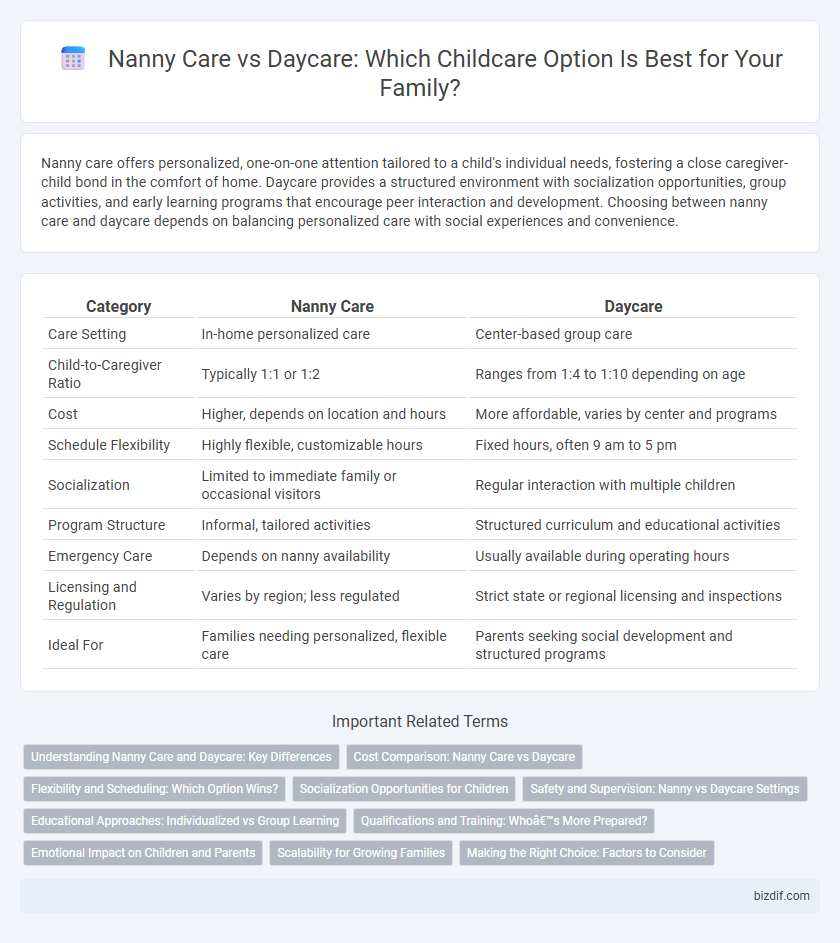Nanny care offers personalized, one-on-one attention tailored to a child's individual needs, fostering a close caregiver-child bond in the comfort of home. Daycare provides a structured environment with socialization opportunities, group activities, and early learning programs that encourage peer interaction and development. Choosing between nanny care and daycare depends on balancing personalized care with social experiences and convenience.
Table of Comparison
| Category | Nanny Care | Daycare |
|---|---|---|
| Care Setting | In-home personalized care | Center-based group care |
| Child-to-Caregiver Ratio | Typically 1:1 or 1:2 | Ranges from 1:4 to 1:10 depending on age |
| Cost | Higher, depends on location and hours | More affordable, varies by center and programs |
| Schedule Flexibility | Highly flexible, customizable hours | Fixed hours, often 9 am to 5 pm |
| Socialization | Limited to immediate family or occasional visitors | Regular interaction with multiple children |
| Program Structure | Informal, tailored activities | Structured curriculum and educational activities |
| Emergency Care | Depends on nanny availability | Usually available during operating hours |
| Licensing and Regulation | Varies by region; less regulated | Strict state or regional licensing and inspections |
| Ideal For | Families needing personalized, flexible care | Parents seeking social development and structured programs |
Understanding Nanny Care and Daycare: Key Differences
Nanny care provides personalized, in-home childcare tailored to an individual child's routine, fostering one-on-one interaction and flexibility that daycare centers may lack. Daycare centers offer structured group environments with scheduled activities designed to promote socialization and early childhood development under professional supervision. Choosing between nanny care and daycare depends on factors such as family preferences, budget, child's social needs, and desired level of individualized attention.
Cost Comparison: Nanny Care vs Daycare
Nanny care typically costs between $15 and $25 per hour, leading to higher overall expenses compared to daycare centers, where weekly rates range from $150 to $300 for full-time care. The personalized attention in nanny care justifies the premium, whereas daycare offers more affordable, structured group environments. Budget-conscious parents often prefer daycare for cost efficiency, while families valuing one-on-one care may opt for the more expensive nanny option.
Flexibility and Scheduling: Which Option Wins?
Nanny care offers unmatched flexibility in scheduling, allowing parents to customize hours and routines to fit their unique needs, unlike daycare centers that operate within fixed business hours. Daycare programs often require adherence to set drop-off and pick-up times, which can limit spontaneity and accommodations for irregular schedules. Families seeking personalized care and adaptable timing often find nanny care to be the superior choice for flexibility.
Socialization Opportunities for Children
Nanny care offers personalized attention but may limit socialization opportunities compared to daycare settings where children interact with peers regularly. Daycare environments foster development of communication skills and teamwork through group activities and play. Exposure to diverse social experiences in daycare supports emotional growth and adaptability in early childhood.
Safety and Supervision: Nanny vs Daycare Settings
Nanny care provides individualized attention with a consistent caregiver, enhancing personalized supervision and immediate response to safety concerns in a familiar home environment. Daycare centers offer structured supervision with multiple staff members trained in child safety protocols and group emergency procedures, ensuring comprehensive oversight. Both settings prioritize child safety but differ in supervision style, with nanny care favoring one-on-one interaction and daycare emphasizing regulated group monitoring.
Educational Approaches: Individualized vs Group Learning
Nanny care offers personalized educational approaches tailored to a child's unique learning pace and interests, fostering one-on-one attention and customized activities. Daycare centers emphasize group learning environments that encourage social interaction, teamwork, and exposure to diverse perspectives among peers. Both methods support early childhood development but differ in structure and social dynamics, impacting educational outcomes based on individual needs.
Qualifications and Training: Who’s More Prepared?
Nanny care providers often have personalized qualifications tailored to individual child needs, frequently including specialized certifications like CPR, early childhood education, and first aid. Daycare staff typically undergo standardized training mandated by state regulations, which may include comprehensive coursework in child development, safety protocols, and group management skills. Evaluating preparation levels depends on the specific certifications and continuing education each provider pursues, with daycare centers offering structured team environments and nannies providing focused one-on-one care.
Emotional Impact on Children and Parents
Nanny care often provides children with personalized attention and consistent emotional support, fostering secure attachments and reducing separation anxiety, which can lead to greater emotional stability. In contrast, daycare exposes children to social interactions with peers, enhancing social skills but sometimes causing overstimulation and emotional stress during adjustment periods. For parents, nanny care offers peace of mind through individualized care and flexibility, while daycare provides structured environments and socialization opportunities that may alleviate parental guilt related to balancing work and family.
Scalability for Growing Families
Nanny care offers personalized attention and flexible scheduling but may face limitations in scalability as family size increases due to higher costs and individual capacity. Daycare centers provide scalable solutions by accommodating multiple children simultaneously, often at a lower per-child cost while fostering social interactions. Growing families benefit from daycare's structured environments and professional staff trained to manage various age groups efficiently.
Making the Right Choice: Factors to Consider
Choosing between nanny care and daycare depends on factors like your child's social development needs, family schedule flexibility, and budget constraints. Nanny care offers personalized, one-on-one attention and flexible hours, while daycare provides structured group activities that foster social interaction and early learning. Assessing your priorities for individualized care versus social exposure helps determine the best fit for your child's growth and your family's lifestyle.
Nanny Care vs Daycare Infographic

 bizdif.com
bizdif.com